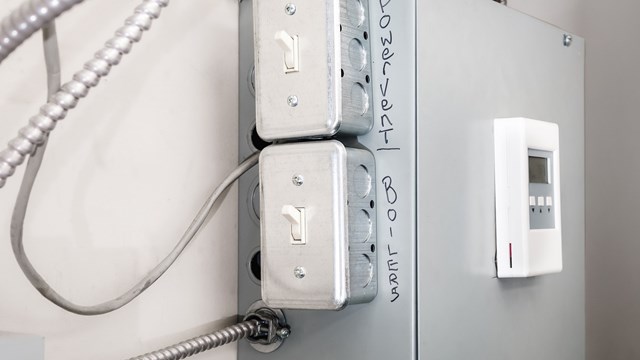When summer rolls around many New Englanders can be found at The Cape, Nantucket or Martha’s Vineyard or any of the numerous beaches that are dotted along the Northeast coast. New England’s stunning water vistas are rivaled only by its swimming pools. The Association of Pool & Spa Professionals (APSP), based in Alexandria, Virginia noted a total of 131,217 in-ground pools in Massachusetts, according to 2011 statistics. If you add in pools in Connecticut, New Hampshire, Vermont and Maine you have a very impressive amount of recreational water requiring maintenance and monitoring.
A Must-Have Amenity
A swimming pool is considered a must-have amenity for many luxury condominium properties. Pools create an atmosphere and an ambiance for any property. They are often a backdrop for social and recreational events and meetings. Beach lovers frequently favor pools for a refreshing swim—minus sand and harsh salt water—followed by a relaxing soak in the spa. Pool exercise classes, or water aerobics, are another great source of recreation, and hot tubs offer therapeutic relief for a host of ailments, as well as an enjoyable relaxation experience. When family and guests come to visit, an on-site pool offers a convenient recreational outlet for all ages. Even a non-swimmer can enjoy a barbecue or cocktail party when the setting includes a lush pool landscape decorated for the event.
“A condo or co-op with a pool is much more appealing than one without, for the very same reason that people often choose their hotel at a vacation destination based on the pool,” says Lisa S. Grepps, director of marketing & communications for the Association of Pool & Spa Professionals. “And the reason most hotels prominently feature their pools and water features in literature and on the web is that people simply love to be in and around the water. From APSP research we know that the top reason people are drawn to pools is for the relaxation and fun they provide. A pool or hot-tub in a condo/co-op setting enables more opportunity to enjoy the water and connect with family, friends and neighbors.”
Some of the more luxurious condos in the Boston area, for example, have full-sized or lap pools for residents to enjoy. Boston’s 45 Province has a full package of hotel-style amenities and sports a fully-equipped workout facility with a four seasons indoor/outdoor pool. Among other amenities, Four Seasons Boston condos also have an indoor pool overlooking the Public Gardens of Boston Common. And in Connecticut, a new homeowners association in Darien, an award-winning luxury property called Kensett, enjoys a newly-built Meeting House-style clubhouse with a heated lap pool, a private soaking pool, and an outdoor fire pit.
Above-ground pools are a possible alternative to a traditional pool for residential homes, but not an optimal choice for condominium properties or public facilities, partly because they’re not nearly as durable as in-ground models, and because they may also prove difficult to modify for compliance with the Americans with Disabilities Act (ADA).
Indoor pools are seen most often within facilities with health clubs and gyms, and/or limited outdoor property. Indoor pools should pose no more of a challenge to modify for ADA requirements than outdoor pools. New construction will not be awarded a certificate of occupancy without meeting all ADA requirements, and any non-compliant facilities may face direct legal action by the state, and civil lawsuits from individuals.
Accessibility & Safety Issues
New ADA guidelines for swimming pools were issued in March of 2011. Requirements apply to existing and new pools, wading pools, and spas (in-ground and portable) and deal with accessibility for all people to include ramps and lifts.
Within the last several years, another major law was passed to ensure the health and safety of anyone utilizing a public or commercial swimming pool or spa. The Virginia Graeme Baker Pool and Spa Safety Act (VGBA), also known as the Pool & Spa Safety Act, was introduced by Florida Rep. Debbie Wasserman Schultz and signed into law by President George Bush in December 2007. Designed to prevent injuries and fatalities caused by swimmers and soakers being trapped by the suction of underwater drains, the law became effective on December 19, 2008. The law was named after the seven-year-old granddaughter of former Secretary of State James Baker III, who died in June of 2002 when the suction from a spa drain trapped her underwater. Under the law, all public pools and spas must have ASME/ANSI A112.19.8-2007 compliant drain covers installed and a second anti-entrapment system installed, when there is a single main drain other than an unblockable drain.
Maintenance, Training & Education
While a condo resident may never realize the amount of due diligence required to keep pool waters safe, properly balanced, and crystal clear at all times, managers and boards should know better. Laurie Batter, of Batter Up! Productions, handles public relations for the National Swimming Pool Foundation (NSPF).
She stresses having a Certified Pool Operator (CPO) as the first step in quality swimming pool maintenance. The NSPF, (www.nspf.org) a leading non-profit trainer, offers the Certified Pool/Spa Operators certification course and the Pool Operator primer courses. Courses are also available through another non-profit, the National Recreation and Park Association (www.nrpa.org). “Preventing drowning, illness and injury are the most important goals when maintaining a pool,” says Batter, “but maintaining a pool also requires a little knowledge of chemistry, microbiology, public health, engineering, and math.”
Because regulations are so strict in New England and elsewhere, especially regarding pool sanitation and the associated chemicals, larger communities with a pool often include a CPO among their staff, or a management company provides one, notes Brandon Whitman, the owner of Lionheart Contracting in Franklin, Massachusetts. “Sometimes an association relies on a chemical supply company to provide the CPO service,” says Whitman, who adds that his company can save associations an average up to 40 percent on chemical bills when they provide pool management services.
Chemically Speaking…
To complicate matters, there is no standard formula for pool chemicals, Whitman says. “You apply chemicals according to the specific site and the local environment,” he says, but notes that there are many choices of products, including chlorine, bromine and salt systems. The reading used in daily pool testing is measuring a chlorine compound that’s a byproduct of the sanitizing action. The other element of sanitization is mechanical filtering, with systems using sand or diatomaceous earth [DE].
“These systems involve piping, pumps and motors that need to be checked before a pool opening. Without proper filtration, the chemicals may test out okay, even though there is particulate clouding the water,” Whitman says. “A turbid pool might look blue because of the chemicals, so it looks right even though it is cloudy… it tricks your eye and you think you’re seeing the blue pool bottom,” when it’s actually blue reflecting from the chemicals and particulate.
“The biggest thing in maintaining a pool is the water. You have to make sure it’s chemically balanced so it’s safe for everybody to swim in,” says Justin Ivey, office manager of the Hamden, Connecticut-based, full service pool company Blue Wave Pool Service & Supplies, Inc. “The pool business is starting to go a little bit digital. There are machines and products out there to allow you to digitally see what is going on with your water. If the chemical balance of a speck of water changes in your pool, the pool company that’s keeping tabs on your pool will be alerted by either phone or email. We call them water quality management systems.”
Pool professionals note that the CPO must have passed a state-certified test to obtain the needed license, and the license of the person performing the task must be displayed on-site.
Ivey favors weekly or bi-weekly in-depth maintenance for the pools he services. “We’ll check for phosphates in the water and really just the knowledge that our staff brings,” he says. “We have staff that has been here over fifteen years. The book may tell you to do it one way but we might know a more efficient way. A lot of times in commercial pools, they’ll have someone on-site that will do an opening and closing and we’ll stop by once a week or every other week to make sure everything is running smoothly.”
The NSPF, according to Batter, cites several safety check items a CPO will include to ensure a pool is running properly. In addition to the three times daily water chemistry checks, Batter lists maintaining pool water at or below 104° F, and keeping filter pressure constant and water circulating. “The pool rules should be posted and clearly visible, and the bottom of the pool should also be clearly visible,” Batter advises.
Ivey values a good vacuum as a favorite maintenance tool. “One of the biggest things we don’t like is sediment gathering in your pool, especially an outdoor pool,” he says. “We use a high powered vacuum that’s hooked up to a filter that cleans sediment. Pool skimmers are also used a lot, but most of the time it’s the on-site maintenance that would do that. But sometimes we find ourselves doing that during the open season. We usually do that in our service calls. We make sure the inside of the pool stays clean and that everything is chemically balanced and in check.”
There are a number of problems that common area pools develop that professionals are called in to correct. “The biggest problem I see with common area pools is algae,” says Ivey. “You would see it along the water or on the side of the pool. A lot of times it involves a little bit of scrubbing and special algae remover chemicals that are pool safe. You shouldn’t just use any type of algae cleaner because sometimes it will react with chemicals that are being put in your pool. Professionals should use algae cleaner—at the very least a pool professional should be consulted before using one.”
In addition to daily routine pool maintenance, a CPO must know and comply with all codes, regulations and state laws.
Pool pros interviewed noted that size, pool usage, pool surroundings and weather are factors that affect the cost of upkeep for a pool, but there is no need for building managers and boards to drown in maintenance costs.
“Now more than ever, the industry is bringing to market energy-saving products that can help facilities save money,” says Grepps. “It’s best to consult an APSP commercial pool management professional to understand how to maximize your condo/co-op’s performance related to energy efficiency. And it’s very important to adhere to a maintenance schedule so that all aspects of the pool and spa are compliant with safety and ADA regulations. There’s no better way to enjoy the summer season than to relax and have fun by the pool and spa.”
A swimming pool is an asset to your community and its residents, and an amenity that everyone should be able to enjoy. A knowledgeable staff and a proactive approach to maintenance and upkeep can be the best defense against potential problems, and will keep your pool in good shape for many years to come.
Anne Childers is a freelance writer and a frequent contributor to New England Condominium and other publications. Staff writer Christy Smith-Sloman contributed to this article.







Leave a Comment